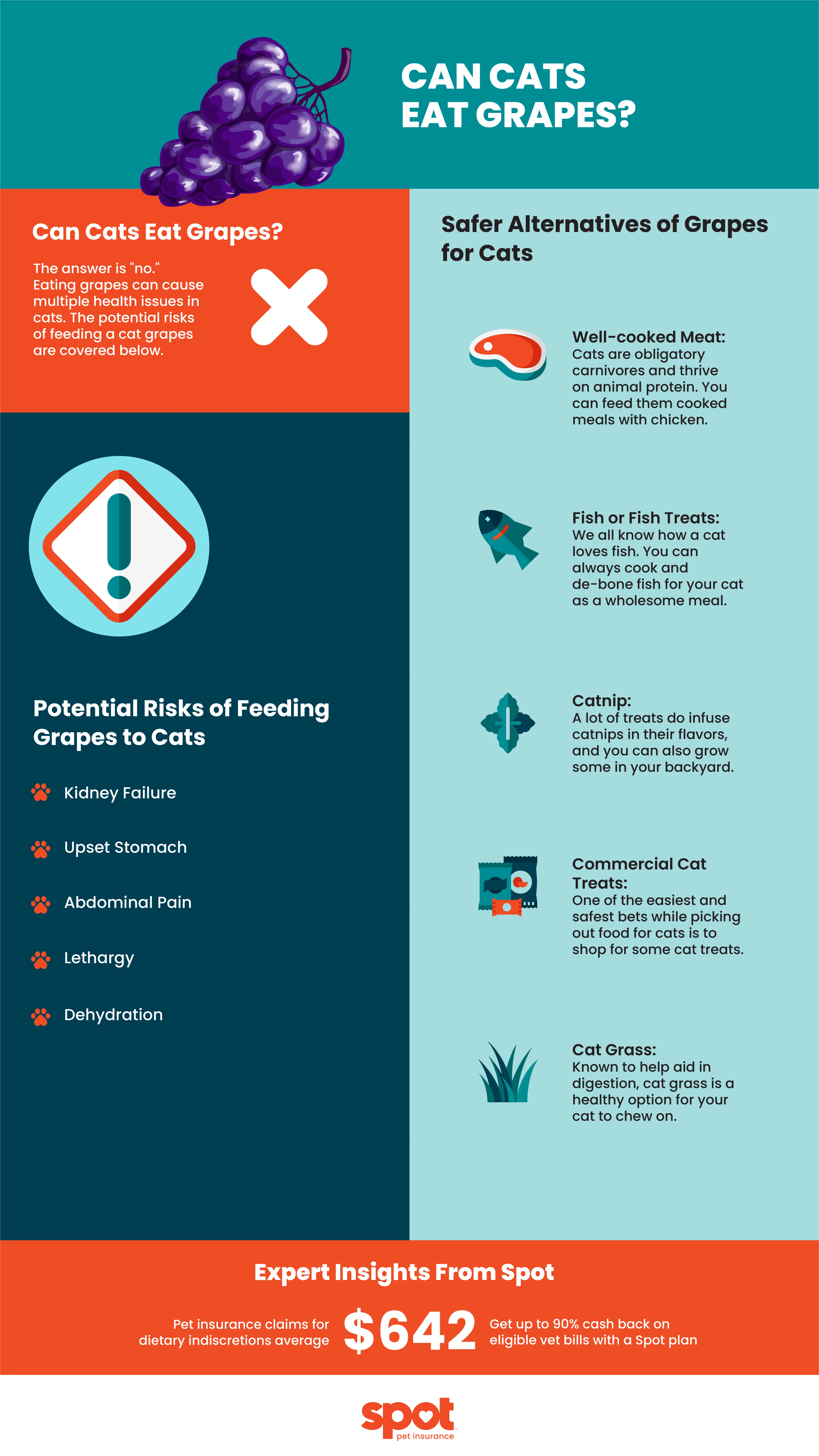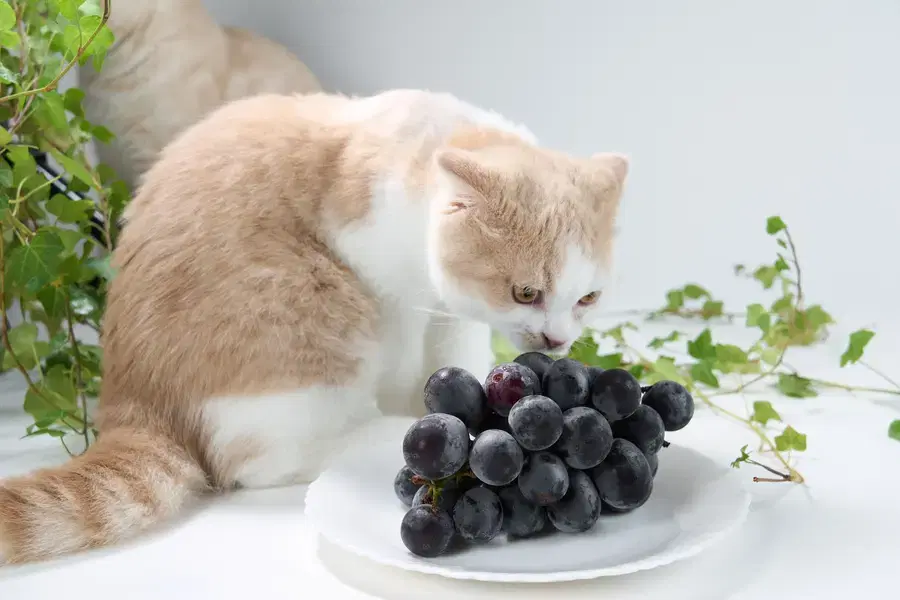Cats are infamous for having discerning tastes. Often, cats may nibble on food that even we don't like, and other times they want to gobble up an entire plate of whatever their human is eating. We may want to share our food and fruits with our cat, but is it healthy to do so?

Can Cats Eat Grapes?
The answer no. To understand cats and grapes better, we have jotted down the reasons why you shouldn't feed grapes to your cats. We’ll also provide you with a list of alternative treats that are safe for your cat to snack on.
Potential Risks of Feeding Grapes to Cats
As humans, we know a hundred ways to eat and drink grapes. Whether fresh, dried or turned into wine, we humans love grapes. However, when it comes to your cat, it’s best to keep grapes away from them. Vets and medical professionals strongly advise against letting cats consume grapes in any form.1 Let’s read more about the risks of feeding grapes to cats.
1. Kidney Failure:
While more research is needed, we do know that grapes are a major cause of kidney failures in dogs. While the extent of this effect on cats is slightly more mild, there is still a risk. The exact compound is yet to be identified, but the chances of your cat falling ill after eating grapes appear to be quite high. The symptoms may look like an increase in thirst with a decrease in urine production.1
2. Upset Stomach
Whenever introducing new foods to cats, it is important to do so slowly and gradually. Cats do not handle diet change well and need time to process. Eating grapes can give them an upset stomach with symptoms like diarrhea and vomiting.2
3. Abdominal Pain:
There is also a risk that your cat may experience indigestion, which can cause sharp abdominal pain, after eating grapes. The symptoms can be restlessness, pain when lying on the stomach, or clear signs of discomfort after consuming grapes.2
4. Lethargy:
Most cat breeds are active which is why when they feel lethargic, it could be cause for concern. The symptoms can include lack of interest, weakness, and excessive sleep.
5. Dehydration:
Cats aren’t always as thirsty as other pets which is why pet owners must keep a check on their cat’s water intake and look for signs of dehydration after eating grapes.
While these are some of the potential risks of feeding grapes to cats, it’s also important to understand that the exact number of grapes that are toxic to cats is unknown. This is why it’s best to steer clear from grapes, to begin with.1
Expert Insights From Spot
Sharing your favorite foods with your pets can be irresistible, but it's important to note that not all human foods are safe for them. Spot's internal data indicates that pet insurance claims for dietary indiscretions average $642*, highlighting the need for vigilance and informed decision-making when it comes to treating your pets.
Safer Alternatives of Grapes for Cats
While cats can’t eat grapes, there are plenty of other options they can and will love. Here are some cat-friendly foods to try.
1. Well-cooked Meat:
As we mentioned, cats are obligatory carnivores and thrive on animal protein. You can feed them cooked meals with chicken. However, it’s important to not season the food with salt or pepper.
2. Fish or Fish Treats
We all know how a cat loves fish. You can always cook and de-bone fish for your cat as a wholesome meal. If you are not into cooking fish, you can always opt for fish-flavored cat treats that are free from added preservatives.
3. Catnip
According to researchers, the catnip plant targets the “happiness” receptors in your cat, making them satisfied and happy with their treat. A lot of treats do infuse catnips in their flavors, and you can also grow some in your backyard.
4. Commercial Cat Treats:
One of the easiest and safest bets while picking out food for cats is to shop for some cat treats. These cat treats are designed to add nutrition to your pet’s daily food intake while maintaining the taste. They can come in ample flavors making it easier for you to pick and choose based on your cat’s preferences.
5. Cat Grass
Known to help aid in digestion, cat grass is a healthy option for your cat to chew on.
While these are some alternatives to grapes for cats, it is always best to ask your vet for a diet plan that your cats can easily adhere to.
How Spot Pet Insurance Can Help
At Spot Pet Insurance, we want our pet parents to worry less about the cost of taking care of their pets. Our plans offer coverage for accidents and illnesses, with up to 90% cash back on eligible vet bills. Pet parents also get access to our 24/7 Pet Telehealth helpline! Call or chat with a veterinary professional anytime you have a question about the health or behavior of your pet! Get a quote today!
Conclusion:
While a single grape may not put your cat in immediate danger, it is always best to keep your cat away from them. Grapes are considered toxic for cats and it’s better to opt for lean meats or cat treats for a wholesome and nutritious diet. If you suspect your cat is undergoing discomfort after eating grapes, you should consult your vet. Always remember to choose the health and happiness of your cat over sharing your food with them. Especially food that may cause them any kind of discomfort.

I've had the privilege of immersing myself in the realm of pet safety. As the owner of an energetic mini golden doodle, I know just how stressful being a pet owner can be. I am dedicated to ensuring our beloved pets enjoy a life brimming with good health.
*Jan 2019 to Aug 2024 administrator claims data. Individual reimbursement results and coverage vary based on plan type.
Mitchell, Sandra C. “Can Cats Eat Grapes?” PetMD, 23 Apr. 2023, www.petmd.com/cat/nutrition/can-cats-eat-grapes.
"Can Cats Eat Grapes?" Purina, n.d., https://www.purina.co.uk/articles/cats/feeding/what-cats-eat/can-cats-eat-grapes.
The information presented in this article is for educational and informational purposes only and does not constitute or substitute for the advice of your veterinarian.












